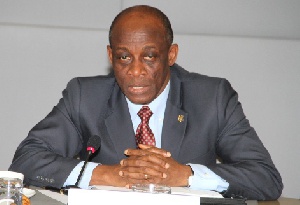 Seth Terkper, Minister of Finance
Seth Terkper, Minister of Finance
Credit ratings agency Fitch is unconvinced about government’s commitment to stay within its budget estimates ahead of November’s elections, predicting that fiscal overruns will rise to 6.3 percent -- above government’s target of 5.3 percent.
“Fiscal slippage ahead of the November elections would increase inflationary and financing pressures. A further decline in commodity prices would negatively impact growth and exacerbate Ghana's twin deficits.
“The 2016 budget calls for a further narrowing of the deficit to 5.3% of GDP. However, Fitch believes that the narrowing will be smaller and forecasts a 2016 fiscal deficit of 6.3 percent,” the agency said.
Despite predicting fiscal slippage ahead of the elections, the ratings agency affirmed Ghana’s long-term foreign and local currency Issuer Default Ratings (IDR) at 'B' with a Negative Outlook.
A statement issued by the ratings agency last week stated that Ghana’s fiscal and external deficits leave the country vulnerable to domestic and external shocks, including low oil prices and tight financing conditions.
“The result has been lower growth (4.1 percent in 2015) and a public debt to GDP ratio of 72 percent, well above the 'B' median of 47 percent. Fitch forecasts that economic growth will increase to 5.4% in 2016 and that public debt will peak this year. However, downside risks remain,” Fitch said.
The agency however lauded the country’s progress on fiscal consolidation in 2015 when the fiscal deficit was narrowed to an estimated 7.2% of GDP from 10.2% in 2014, largely on account of the US$918mn Extended Credit Facility arrangement with the IMF.
The Fund programme is credited with helping government keep expenditures in line with a revised 2015 budget, while earning revenues in excess of what was forecasted in the budget.
The 2016 growth outlook, Fitch said, is dependent on a combination of domestic and external factors. Domestically, oil and gas production will increase as the Tweneboa, Enyenra and Ntomme oil fields come online in August and add 23,000 barrels per day in oil production; and associated gas exploitation will bring an approximated 50 percent increase in gas production.
In Fitch's view, the local currency will experience greater stability in 2016 and lower levels of depreciation. The agency expects the cedi to trade at an average exchange rate of 4.1/US$; this would be a depreciation of about 8% from the 2015 average compared with the 22% depreciation that the cedi experienced in the previous year.
Policy rate, inflation et al
The Monetary Policy Committee (MPC) of the Bank of Ghana chose to keep the monetary policy rate at 26 percent, after five rate hikes in 2015. The MPC noted that exchange rate stability had contributed to February monthly inflation dropping slightly, to 18.5% from 19% in January.
Nevertheless, Fitch said inflation expectations remain high and the current level is still well above the target band of 8+/- 2%. The agency expects that the central bank will maintain a relatively tight monetary policy in 2016, which will be supportive of greater price and exchange rate stability.
“The depreciating exchange rate has led to a deterioration in the asset quality of the Ghanaian banking sector. The ratio of non-performing loans (NPL) to total loans increased from 11% in June 2015 to 14% by October. Increasing NPLs are a risk, but overall the Ghanaian banking sector remains liquid and well-capitalised.
“The rating is constrained by low GDP per capita, which at US$1,313 is less than half the 'B' median. However, the 7.2% annual growth rate that Ghana experienced in 2005-14 substantially increased the country's performance on human development indicators,” the ratings agency said.